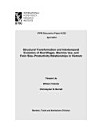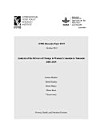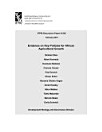Land Constraints and Agricultural Intensification in Ethiopia: A Village-Level Analysis of High-Potential Areas
Derek Headey · Mekdim Dereje · Jacob Ricker-Gilbert · Anna Josephson · Alemayehu Seyoum Taffesse
sept. 2013 · IFPRI Discussion Paper Livre 1 · Intl Food Policy Res Inst
5,0star
1 avisreport
E-book
40
Pages
family_home
Éligible
info
reportLes notes et avis ne sont pas vérifiés. En savoir plus
À propos de cet e-book
Highland Ethiopia is one of the most densely populated regions of Africa and has long been associated with both Malthusian disasters and Boserupian agricultural intensification. This paper explores the race between these two countervailing forces, with the goal of informing two important policy questions. First, how do rural Ethiopians adapt to land constraints? And second, do land constraints significantly influence welfare outcomes in rural Ethiopia? To answer these questions we use a recent household survey of high-potential areas. We first show that farm sizes are generally very small in the Ethiopian highlands and declining over time, with young rural households facing particularly severe land constraints. We then ask whether smaller and declining farm sizes are inducing agricultural intensification, and if so, how. We find strong evidence in favor of the Boserupian hypothesis that land-constrained villages typically use significantly more purchased input costs per hectare and more family labor, and achieve higher maize and teff yields and high gross income per hectare. However, although these higher inputs raise gross revenue, we find no substantial impact of greater land constraints on net farm income per hectare once family labor costs are accounted for. Moreover, farm sizes are strongly positively correlated with net farm income, suggesting that land constraints are an important cause of rural poverty. We conclude with some broad policy implications of our results.
Notes et avis
5,0
1 avis
Donner une note à cet e-book
Dites-nous ce que vous en pensez.
Informations sur la lecture
Smartphones et tablettes
Installez l'application Google Play Livres pour Android et iPad ou iPhone. Elle se synchronise automatiquement avec votre compte et vous permet de lire des livres en ligne ou hors connexion, où que vous soyez.
Ordinateurs portables et de bureau
Vous pouvez écouter les livres audio achetés sur Google Play à l'aide du navigateur Web de votre ordinateur.
Liseuses et autres appareils
Pour lire sur des appareils e-Ink, comme les liseuses Kobo, vous devez télécharger un fichier et le transférer sur l'appareil en question. Suivez les instructions détaillées du Centre d'aide pour transférer les fichiers sur les liseuses compatibles.










